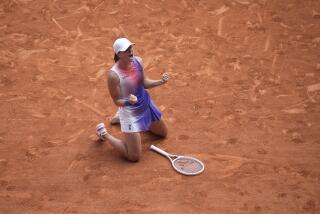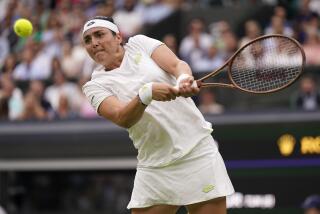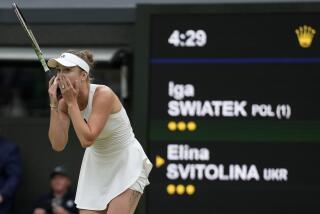Italy’s Schiavone wins French Open in a story for all ages
- Share via
PARIS -- Francesca Schiavone wasn’t even born when Italy last saw one of its own win a Grand Slam tennis tournament. Until Saturday, no one had been born in all of history who could boast of having witnessed an Italian woman accomplish such a feat.
All that changed on a humid Paris afternoon when Schiavone watched her opponent in the French Open final misfire a backhand high into the air on match point. As the ball dropped onto the red clay, so did Schiavone, lying flat on her back in disbelief before turning over to give the rust-colored dirt a jubilant smooch.
It was an unexpected win for a player ranked 17th in the world, a veteran with a decent, but not spectacular, record who had never gotten past the quarterfinals in a Slam. The smart money was on her opponent, Samantha Stosur of Australia, whose fearsome kick serve and hard-struck groundstrokes were supposed to leave Schiavone biting the dust, not kissing it.
Instead, power met its match in guile.
Schiavone mixed it up with skidding slices and aggressive attacks at the net, and as the player from Down Under grew more downcast, the one from Milan grew more confident. In the end, the Italian ran away with the second-set tiebreaker to win her first Slam, barely two weeks shy of her 30th birthday.
“Everybody have the chance to be who really you want to be, and to do everything in your life,” said Schiavone, who was convinced as a little girl that she wanted to be a tennis player. “This is what’s happen to me.”
Her 6-4, 7-6 (2) victory erased any bitter memories she might have harbored of playing Stosur in last year’s French Open, when the Aussie knocked her out in the first round.
Schiavone came to Paris determined to improve on that showing, though the image of her raising the silver trophy on the last day and basking in the applause of thousands probably crossed no one’s mind but her own, if that. After all, no Italian had made it into a Grand Slam final since Adriano Panatta won the men’s title here at Roland Garros in 1976.
As the new women’s champion, Schiavone’s instant elevation as a national hero was confirmed even before the awards ceremony began, when a cellphone was handed to her with Italian President Giorgio Napolitano on the line.
“Congratulations. Enjoy this moment. It was an honor for Italy,” a beaming Schiavone said the president told her.
The victory in Paris, for only the fourth title of her career, will vault Schiavone to No. 6 in the rankings. Stosur, the first Australian woman to contest a Grand Slam final since Wendy Turnbull at the 1980 Australian Open, will hold steady at No. 7.
Stosur was the heavy favorite going into the match, with an arsenal of powerful forehands and difficult serves at her disposal, and she thought that her previous wins over her opponent, most recently in a final in Japan last October, would give her an edge.
But it was a different Schiavone who showed up Saturday, one who had predicted the day before that the smarter player, not necessarily the stronger, would prevail.
She leaned in to catch Stosur’s kick serve and neutralize it early, rather than stay back. Looping topspin forehands and low backhand slices also managed to keep Stosur from finding much of a rhythm with her own groundstrokes.
And when Schiavone saw a path open up to the net, she charged, often putting away deftly angled volleys like the one that earned her a second set point in the first set. A minute later, she had it in the bag on a backhand error from Stosur, who let out a shout of frustration.
In the second set, the momentum seemed to swing toward the Australian, who finally saw her first service break after an hour’s play beneath windless blue skies. But the Italian broke back three games later, crouching and pouncing on Stosur’s serve and a short ball that bounced off the net and sat up like easy prey.
The tiebreaker was all Schiavone, who stuck to the game plan that had seen her through to that point, with winners flying off her racquet from the backcourt and at the net. After 98 minutes, it was over.
“She went for it, and everything came off,” Stosur said. “It takes guts to do that, and she did it.”
Accepting the trophy, the exuberant Schiavone was one of the few players on the women’s tour who could credibly encourage the 26-year-old Stosur by saying, “Next time. You are young. You can do it.”
But then she cuddled the Suzanne Lenglen Cup like a child would a teddy bear. During her news conference, she spoke of wanting “to go home to mommy and daddy” to celebrate.
At heart, she was still the little girl with a dream.
More to Read
Go beyond the scoreboard
Get the latest on L.A.'s teams in the daily Sports Report newsletter.
You may occasionally receive promotional content from the Los Angeles Times.











